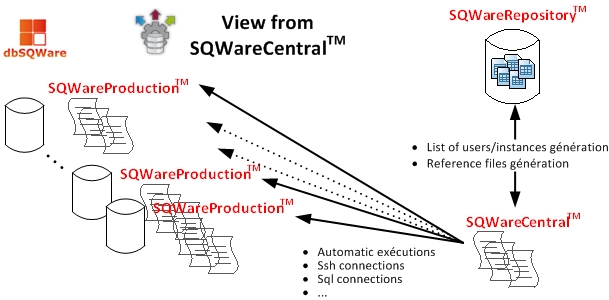Template:SQWareCentralPres
Presentation
Usage
SQWareCentral, is the central point of dbSQWare for all RDBMS.
Usage examples:
- Central point of ssh connections
- Search of instances, database/schema, ...
- Deployment scripts of SQWareProduction for each RDBMS managed
- Collection of indicators for each RDBMS managed
- Repeat of collection for each RDBMS managed
- Execute any type of action on a list
- ...
Installation guide for SQWareCentral
Explanation of directories
Directories located in $gvsqw_RootexpdbCentral:
- action : Directory containing specific files for each managed RDBMS
- bin : Directory containing standard scripts
- bin_cust : Directory containing customs scripts for your environnement
- etc : Directory containing the standard files of configuration
- etc_cust : Directory containing the customs files of configuration for your environnement (overload standards)
- help : Directory containing the standard files of help
- help_cust : Directory containing the customs files of help for your environnement
- lib : Directory containing the generic shell function librairies
- lib_cust : Directory containing the generic shell function librairies (overload standards)
- logs : Directory containing logs and temporaries files
- menu : Directory containing the standard menus
- menu_cust : Directory containing the custom menus for your environnement
General architecture diagram SQWareCentral™ (when the SQWareProduction™ module is locally installed)
action
oracle
Centralised actions for oracle
Allows you to perform actions on oracle instances centrally:
- Collection of indicators
- Deploying Scripts
- Repeat of collection of indicators
- ...
See the detailed help for oracle
sybase
Centralised actions for sybase
Allows you to perform actions on sybase instances centrally:
- Collection of indicators
- Deploying Scripts
- Repeat of collection of indicators
- ...
See the detailed help for sybase
mysql
Centralised actions for mysql
Allows you to perform actions on mysql instances centrally:
- Collection of indicators
- Deploying Scripts
- Repeat of collection of indicators
- ...
See the detailed help for mysql
mssql
Centralised actions for mssql
Allows you to perform actions on mssql instances centrally:
- Collection of indicators
- Deploying Scripts
- Repeat of collection of indicators
- ...
See the detailed help for mssql
mongodb
Centralised actions for mongodb
Allows you to perform actions on mongodb instances centrally:
- Collection of indicators
- Deploying Scripts
- Repeat of collection of indicators
- ...
See the detailed help for mongodb
DB2
Centralised actions for DB2
Allows you to perform actions on DB2 instances centrally:
- Collection of indicators
- Deploying Scripts
- Repeat of collection of indicators
- ...
postgres
Centralised actions for PostgreSQL
Allows you to perform actions on postgres instances centrally:
- Collection of indicators
- Deploying Scripts
- Repeat of collection of indicators
- ...
See the detailed help for PostgreSQL
teradata
Centralised actions for Teradata
Allows you to perform actions on teradata instances centrally:
- Collection of indicators
- Deploying Scripts
- Repeat of collection of indicators
- ...
See the detailed help for Teradata
cassandra
Centralised actions for Cassandra
Allows you to perform actions on cassandra instances centrally:
- Collection of indicators
- Deploying Scripts
- Repeat of collection of indicators
- ...
See the detailed help for Cassandra
ingres
Centralised actions for ingres
Allows you to perform actions on ingres instances centrally:
- Collection of indicators
- Deploying Scripts
- Repeat of collection of indicators
- ...

